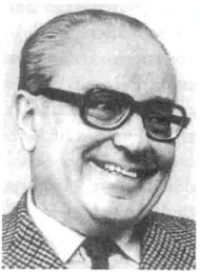Alberto Ginastera
 Alberto Evaristo Ginastera (April 11, 1916 – June 25, 1983) was an Argentine composer of classical music. He is considered one of the most important Latin American classical composers.
Alberto Evaristo Ginastera (April 11, 1916 – June 25, 1983) was an Argentine composer of classical music. He is considered one of the most important Latin American classical composers.Ginastera grouped his music into three periods: "Objective Nationalism" (1934–1948), "Subjective Nationalism" (1948–1958), and "Neo-Expressionism" (1958–1983). Among other distinguishing features, these periods vary in their use of traditional Argentine musical elements. His Objective Nationalistic works often integrate Argentine folk themes in a straightforward fashion, while works in the later periods incorporate traditional elements in increasingly abstracted forms.
The progressive rock group Emerson, Lake & Palmer brought Ginastera attention outside of modern classical music circles when they adapted the fourth movement of his first piano concerto and recorded it on their popular album Brain Salad Surgery under the title "Toccata". They recorded the piece not only with Ginastera's permission, but with his endorsement. In 1973, when they were recording the album, Keith Emerson met with Ginastera at his home in Switzerland and played a recording of his arrangement for him. Ginastera is reported to have said, "Diabolical!". Emerson misunderstood Ginastera's meaning: Ginastera spoke almost no English and meant that their interpretation was frightening, which had been his intent when he wrote it; Emerson, being British, took it to mean "awful". Emerson was so upset that he was prepared to scrap the piece until Ginastera's wife intervened saying that he approved. Ginastera later said, "You have captured the essence of my music, and no one's ever done that before." This experience is detailed in the liner notes to Brain Salad Surgery. Emerson would later go on to release an adaptation of one of the pieces from Ginastera's Suite de Danzas Criollas entitled "Creole Dance". "Toccata" also gained fame as the theme to the New England cult TV show Creature Double Feature. Italian neo-classical electric guitarist Alex Masi has also recorded an adaptation of "Toccata," one strongly based on the aforementioned ELP version, rather than the original orchestral piece. It can be found on 1989's "Attack of the Neon Shark".
His Cantata para América Mágica (1960), for dramatic soprano and 53 percussion instruments, was based on ancient pre-Columbian legends. Its West Coast premier was performed by the Los Angeles Percussion Ensemble under Henri Temianka and William Kraft at UCLA in 1963.
 Alberto Ginastera Latest Sheets Feed
Alberto Ginastera Latest Sheets Feed Alberto Ginastera Latest Requests Feed
Alberto Ginastera Latest Requests Feed
Advertisement
Advertisement
Total 75 sheet(s) found, listing between 0 - 20.
| Song | Added By | Pages | Instruments | Sheet Type | File |
| Zamba |
nahuel (3)
3442d ago
|
2 | Piano, Vocal | Transcription |
|
| Milonga |
larrymarried (1)
3603d ago
|
2 | Piano | Original |
|
| Sonata no 1 op. 22 |
ibajakarta (3)
4597d ago
|
24 | Piano | Book |
|
| El árbol del olvido |
Betun33 (33)
4990d ago
|
4 | Vocal | Original |
|
| Danza Moza Donosa (guitar duet) |
guitarizar (85)
4997d ago
|
6 | Guitar | Transcription |
|
| Danza de la moza donosa |
LuisGanzo (151)
5013d ago
|
2 | Guitar | Transcription |
|
| Cuyana |
LuisGanzo (151)
5013d ago
|
3 | Guitar | Transcription |
|
| Argentinian Dances |
guimiller (5)
5042d ago
|
14 | Piano | Book |
|
| Sonate Nº 3 Op. 55 |
guimiller (5)
5042d ago
|
8 | Piano | Book |
|
| Danzas argentinas |
rtyhgfvbn (28)
5045d ago
|
14 | Piano | Book |
|
| Milonga |
rhdd11 (31)
5072d ago
|
2 | Piano | Original |
|
| American Preludios |
salecello (23)
5072d ago
|
23 | Piano | Original |
|
| Toccata |
lpopova (10)
5111d ago
|
12 | Piano | Original |
|
| cancion al albol del olvido |
Nanin7 (1)
5118d ago
|
2 | Piano, Vocal | Other |
|
| Danza Final |
Sunshinenoelley (1)
5125d ago
|
1 | Cello | Transcription |
|
| Danzas argentinas |
daveswims2 (1)
5125d ago
|
14 | Piano | Other |
|
| Milonga (El Arbol del Olvido) |
orewashinanai (2)
5126d ago
|
2 | Piano | Other |
|
| Suite de danzas criollas |
cobando (5)
5130d ago
|
12 | Piano | Book |
|
| Danzas Argentinas |
cammy (1)
5130d ago
|
8 | Piano | Transcription |
|
| Piano Sonata No. 1 |
bdelacruz4 (2)
5131d ago
|
24 | Piano | Original |
|

